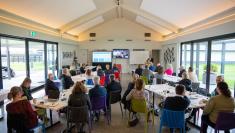
Government firmly behind racing, says new Minister
The Labour Government’s support of the racing industry was firmly signalled after its landslide election victory in 2020 and its commitment is ongoing, new Minister for Racing Kieran McAnulty has emphasised.
McAnulty achieved a personal goal when he recently took over the role and dismissed any concern that racing had a lesser seat at the table after succeeding Deputy Prime Minster Grant Robertson.
“I think the signal from the Government was pretty clear after the last election when it kept racing as a separate portfolio,” the MP for Wairarapa said.
“People suggested that given the Deputy Prime Minister had Sports and Racing that the Prime Minister might want to combine the two.
“She was asked about that at the press conference when she announced who was the Minister and was in Cabinet and she was very clear on that.
“She said that the Government sees racing as a significant and very important industry for New Zealand and it deserves to have its own Minister.
“That sends a signal to the industry that this Government, regardless as to who is the Minister, takes it very seriously.
“It’s not an also ran, it’s a prominent front-runner. Racing is a significantly important export industry to this country and provides just as much as the fishing industry to our GDP and no one is suggesting we get rid of the Minister for Fisheries.”
McAnulty also has ‘skin’ in the game having spent seven years as a TAB bookmaker, as an owner and with overseas experience of the industry.
“I would be reluctant to suggest that I am more passionate or capable than previous Ministers, but I am very happy to say that this role is something I personally wanted,” he said.
“I am passionate about the racing industry, not just because I enjoy it or as a participant in it through working for the TAB or as a previous owner in a horse, but because I want to see it thrive.
“Importantly, I want to see it as sustainable and there are considerable challenges heading into the future and it’s fair to say that racing hasn’t for a long time held the cultural significance in New Zealand that it may have done in the early days.
“While I recognise there is more competition for the entertainment dollar these days, I still want to be able to play my part in securing it’s future and not just the three codes, but also the sporting codes that rely on the success of the racing industry.”
Competition from offshore wagering operations presents an issue and steps have been taken to see they make returns to the industry.
“I think there are two main issues, the first is the competition from overseas providers and the challenges that brings to the TAB,” McAnulty said.
“I say that because of the unique structure of the TAB and its role which is to solely provide for the racing industry and sporting bodies in this country.
“I say unique because I am not aware of any country as a whole that sets its wagering system up to benefit the racing codes and sporting bodies and that should be protected.
“If the racing industry is doing well, that means the clubs are doing well and the sporting codes are doing well and that flows down because we know racing is a significant employer in rural New Zealand.
“I am not suggesting any particular policy solution to that, but I am in conversations with the Minister of Internal Affairs and with the TAB and intend to meet with the codes and all key stakeholders to get their views and insights how we can best protect the structure.
“It’s a challenge from overseas competitors because they don’t contribute like the TAB, although this Government has brought in a requirement that they do and that has already started to see some revenue flow back.
Public acceptance of industry workings is another major area requiring diligent monitoring according to the new Minister for Racing.
“The second challenge is the social licence. People involved in racing are passionate about the industry and they are passionate about horses and dogs,” McAnulty said.
“We know that you don’t necessarily go into the industry with the expectation of making money, they do it because they love it.
“We also know that in order to maintain social licence the racing industry needs to uphold the highest possible standards of animal welfare and if one code isn’t doing that then it undermines the social licence of the entire industry.”
While the report provided by Australasian racing and breeding supremo John Messara recommended the outsourcing of the TAB, that is an area still up for discussion.
“All I’ll say is that while the Messara Report was commissioned by the Government, it isn’t Government policy and I am keen to ensure that any future legislation that impacts the industry, at the core of that is the benefits of it are for racing and sporting bodies,” McAnulty said.
“I am not interested in anything that takes away from funding them. I think New Zealand has a blueprint that other countries could learn from in terms of how we continue support the industry through the structure of the TAB.”
Several states in Australia have implemented a Point Of Consumption Tax on all wagers placed by residents regardless of the licence registration location of the wagering operator, and that is an area under investigation here.
“There are a number of options that have already been looked at and I am keen to look at it more broadly,” McAnulty said.
“That’s not something that I can do by myself. That is something I need to do with the Minister of Internal Affairs because the Racing portfolio is split across both.
“The Minister of Internal Affairs deals with the wagering side and I deal with the industry side. As it happens, Jan Tinetti is a personal friend of mine and we work incredibly well together.
“We are on the same page to work toward something the industry will be happy with. When I say industry, I don’t just mean the codes and participants but also the punters and owners as well.
“In the past, the punters and owners have been overlooked and I want to look into options to attract new owners.”
Rationalisation of New Zealand racetracks has been another hot topic and one that McAnulty would like to see dealt with at a local level.
“I think the initial proposal was that there should be a racetrack remaining in each region and I want to observe that,” he said.
“My electorate has a wonderful rural track in Tauherenikau and that would be a travesty if that were to close down and lose its two premium slots on January 2 and February 6.
“There are examples we can point to which make sense, but we don’t want this to be a political decision. We want this to be a decision that the codes and clubs come to themselves.
“That is a process that has been established and the Minister for Racing doesn’t interfere and is looking to line up independent mediators if the clubs and codes can’t come to a decision.”
COVID-19 had a severe impact on the availability of overseas workers within both the racing and breeding industries and with borders opening, McAnulty is keen to take full advantage of opportunities that provided.
“The racing industry is not alone in its challenges to find labour and I am keen to play my part and promote the career opportunities within racing,” he said.
“We know the opportunities that exist once you get your foot in the door and how many people that have succeeded at the highest level after starting out as a stable hand etc.
“There are so many opportunities and I’m just not sure that is well enough known. I want to do what I can and highlight to young people the opportunities that exist in racing.”
More innovative options now needed to be implemented to advance career pathways.
“In the past, we as an industry have relied on a family connection to bring through the next generation and I don’t think we can rely on that anymore,” McAnulty said.
“In a tight labour market, there is so much competition so I’m keen to do what I can. The borders opening will help, but what I would like to see is workers, be it jockeys, trainers or in the breeding industry, see New Zealand as an opportunity to get that experience.
“When I worked as a bookie in Ireland, the number of people that I talked to in the industry that had been to New Zealand and done their OE before going home and carrying on their careers was really significant.”








